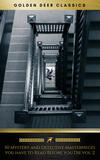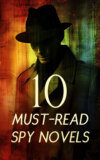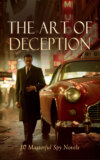Buch lesen: «Jacob's Ladder», Seite 12
“Felix,” he said, “let me present you to Miss Haslem. Lord Felixstowe – Miss Haslem.”
The two young people exchanged the customary greetings. The girl began to apologise for her hair. Her cup of happiness was very nearly filled. And then Jacob dashed it to the ground.
“I want you to take me back to town as soon as you’ve had a drink,” he intervened, addressing the young man. “We sail for America to-morrow.”
CHAPTER XXIV
Felixstowe carefully concluded the enfolding of Jacob’s outstretched form in an enormous rug, placed a tumbler of soda water and some dry biscuits within easy reach of him, and stepped back to inspect his handiwork.
“A bit drawn about the gills, old top,” he remarked sympathetically. “How are you feeling now?”
“Better,” Jacob murmured weakly. “And kindly remember that I am your employer, and don’t call me ‘old top.’”
“Sorry,” was the cheerful reply. “One has to drop into this sort of thing by degrees. I’ve a kind of naturally affectionate disposition, you know, when I’m with a pal.”
“Get your typewriter and practise,” Jacob directed. “I’ll try and give you a letter.”
“So to the daily toil,” the young man chanted, as he turned away. “I’ve got the little beauty in the saloon.”
Jacob groaned and closed his eyes, for the motion of the steamer, two days out of Liverpool for New York, still awoke revolutionary symptoms in his interior. Presently Felixstowe returned, carrying a small typewriter. He arranged himself in the adjoining chair, drew up his knees, took out the typewriter from its case, and, with his pipe in the corner of his mouth, sat waiting.
“Ready,” he announced.
“Oh, damn!” Jacob groaned. “Write a letter to yourself.”
“I’ll write a line to you,” the young man suggested soothingly.
He attacked his task very much as a child trying to spell out “The Bluebells of Scotland” on a piano with one finger. In a few minutes, with an air of pride, he drew out the sheet and passed it to his companion. Jacob stretched out a feeble hand and read listlessly.
Dear Mr. Pratt,
I believe that a couple of dry Martini cocktails would do us both good.
Faithfully yours,Felixstowe.Sec. (Very sec!)
A weak smile parted Jacob’s lips and he grunted assent. Felixstowe exchanged cabalistic signs with the deck steward, and in due course the latter appeared with a couple of glasses filled with frosted amber liquid. Jacob hesitated for a moment doubtfully.
“Try mental suggestion,” the young man advised, looking lovingly at his glass. “Put it where the cat can’t get it and say to yourself, ‘This is going to do me good.’ Cheerio!”
Two empty glasses were replaced upon the tray. Jacob raised himself a little in his chair.
“I believe I feel better already,” he announced.
“Won’t know yourself in an hour’s time,” his companion assured him. “I shall give you a pint of champagne and a sandwich at twelve o’clock, and you’ll be taking me on at shuffleboard after lunch. Hullo, another wireless!”
“Read it for me,” Jacob directed.
The young man tore open the envelope and read out the message:
Brother’s condition unchanged. Your presence urgently needed. Will meet New York. Morse, Secretary.
“Poor old Sam!” Jacob murmured.
“He’ll pull through, if he’s got your constitution,” Felixstowe observed cheerfully. “I’ve never seen you under the weather yet.”
“That’s because I take care of myself,” Jacob said a little severely.
“Great Cæsar’s ghost! Hi!”
The young secretary was sitting bolt upright in his chair. A man and a woman, passing along the deck, turned in surprise at the challenge. The surprise speedily became amazement, and the amazement universal.
“Sybil Bultiwell!” Jacob gasped, forgetting all about his seasickness.
“Maurice Penhaven!” Felixstowe exclaimed. “What in the name of thunder are you two doing here together?”
Sybil, being a woman, was the first to recover herself. She laughed softly.
“We do seem to come across one another in strange places and under strange conditions, don’t we?” she said to Jacob. “This, perhaps, is the strangest of all. I am on my honeymoon.”
“Married?” Jacob gasped, throwing off his rugs and sitting upright. “But I was going to – you were – oh, damn!”
She made a little grimace and drew him to one side.
“I can guess what is in your mind, Mr. Pratt,” she said, “and I want to have a perfectly clear understanding with you. Tell me now, did I ever give you the slightest encouragement? Did I ever give you the faintest reason to hope that I should ever, under any circumstances, be willing to marry you?”
“I can’t say that you did,” Jacob admitted sadly, gripping at the rail against which they were standing. “I never left off hoping, though.”
“Now that I have become unexpectedly a very happy woman,” Sybil went on, with a new softness in her tone, “I will confess that I was perhaps unreasonable so far as regards your treatment of my father.”
“Thank God for that, anyhow!” Jacob muttered.
“There were times,” Sybil went on reflectively, “when I very nearly admired you.”
“For example?”
“When you opened the door of the house in Russell Square for me and calmly took back your notes which I had been to fetch. That was one time, at any rate. But I never had the slightest feeling of affection for you, or the slightest intention of marrying you, however long you waited. Now I am going to tell you something else, if I may.”
“Go on, please,” Jacob begged, in a melancholy tone.
“I do not think that you have ever been really in love with me. You are rather a sentimental person, and you were in love with a girl in a white gown who walked with you in a rose garden one wonderful evening, and was very kind to you simply to atone for other people’s rudeness. It wasn’t you I was being kind to at all. It was simply a sensitive guest who had been a little hurt.”
“I see,” he sighed.
“I had no idea,” she went on reflectively, “that you were likely to misunderstand. It was one of my father’s weaknesses that he sometimes forgot himself and did not sufficiently consider people’s feelings. He was rude to you that night, and I was ashamed and did my best to atone. I had no idea that you were going to take it all so seriously. But I want you, Mr. Pratt,” she went on earnestly, “to remember this. It was no real person with whom you walked in the garden that night. It was no real person the recollection of whom you have chosen to keep in your heart all this time, and with whom you have fancied yourself in love. It was just a creature of your own fancy. You are such a kind-hearted person really, and you ought to be happy. Can’t you untwine all those sentimental fancies of yours and find some really nice, human girl with whom to bedeck them? There are so many women in the world, Jacob Pratt, who would like to have you for a husband, apart from your money.”
“If it weren’t for the money – ” Jacob began sadly.
She interrupted him with a little peal of laughter.
“Faithless!” she exclaimed. “I can see that you have some one in your mind already. Don’t think too much about your wealth. I am a very ordinary sort of girl, you know, and it didn’t make any difference to me. Maurice hasn’t as many hundreds a year as you have thousands, but I am quite content. Your money may make marriage more possible with a girl who has been extravagantly brought up, but that needn’t prevent her really caring for you. So please cheer up, Mr. Jacob Pratt, and let us all be friends.”
They turned back towards the others. The explanation between Lord Felixstowe and his sister’s quondam fiancé had been delayed by the intervention of the Captain, who had paused on his daily promenade to say a few words. Felixstowe was just then, however, undertaking his obvious duty.
“Seems to me, young fellow,” he said, addressing Penhaven, “that a few words of explanation are due between us two.”
“You needn’t come the heavy brother,” the latter replied. “Your sister and I broke our engagement mutually, some time ago. I can assure you, and she will tell you the same, that her feelings towards me have changed far more completely even than mine towards her.”
“Well, I’m jiggered!” Lord Felixstowe exclaimed.
“Where did you and Captain Penhaven meet?” Jacob asked miserably.
“I used to go in, as you know, and play Lady Mary’s accompaniments,” Sybil explained. “Captain Penhaven was often there and used to take me home sometimes. From my own observation,” she went on, “I can confirm what Maurice has just said about the relations between Lady Mary and himself. For some reason or other she became absolutely indifferent to him about that time.”
“So, according to you two, nobody’s got a grievance,” Felixstowe observed. “If my new employer’s satisfied – well, I suppose that’s an end of it.”
“Your what?” Sybil demanded.
The young man waved his hand genially towards Jacob.
“He’s taken me on as secretary,” he announced. “First job, trip out to America to visit sick brother and look after business complications. We’ve dealt with weighty affairs already this morning.”
“What’s become of your Mr. Dauncey, then?” Sybil enquired.
“I have made him secretary of the Cropstone Wood Estates Company,” Jacob told her. “He has my affairs to look after as well while I am away.”
A sound familiar to the nautical ears of Lord Felixstowe reached them from the bows of the ship.
“Sun’s over the yardarm,” he announced. “How are you feeling now, old – Mr. Pratt?”
“You order,” Jacob replied.
It was a moderately cheerful little party who drank the health of the bride and bridegroom. Afterwards, however, Jacob passed a day of curiously tangled sensations. The summons to New York had been too peremptory for him to delay even an hour, but he had sent a note to Miss Bultiwell at the address in Belgrave Square, asking for a few minutes’ interview before he left. Naturally he had received no answer. Now he was face to face with absolute and accomplished failure in one of the fixed purposes of his life. He was an obstinate person, used to success, – so used to it, in fact, that the present situation left him dazed. His first determination, when success had smiled upon him, had been to marry Sybil Bultiwell. He had never flinched from that purpose. He had even, in his heart, considered himself engaged. Any thoughts which might have come to him of any other woman he had pushed away as a species of infidelity. And now there wasn’t any Sybil Bultiwell. She was married and out of his reach. He felt that the proper thing for him to do was to go down to his cabin and nurse his broken heart; instead of which he drank champagne for dinner, found a few kindred spirits who liked a mild game of poker, and went to bed whistling at two o’clock in the morning. His young companion, who had won a fiver and was in a most beatific state, came and sat on his bunk whilst he undressed.
“Jacob, my well-beloved,” he said, “you are taking this little setback like a hero.”
“What setback?” Jacob asked.
“Little affair of Miss Bultiwell,” Felixstowe replied, gazing admiringly at Jacob’s well-suspended silk socks. “Mary told me all about it.”
Jacob sighed heavily.
“Nasty knock for me,” he admitted, with a curiously unconvincing note of gloom in his tone.
“And Mary, poor old girl, is in the same boat,” Felixstowe went on reflectively. “Still, she never cared much for Maurice … led him an awful dance, the last few months. And you were head over heels in love with Miss Bultiwell, weren’t you?”
“I adored her,” Jacob declared, taking a long gulp of the whisky and soda which he had brought in for a nightcap. “Worshipped her,” he added, finishing it with much satisfaction.
Felixstowe sighed sympathetically.
“Rotten luck for you, having ’em on board, honeymooning,” he observed. “Never mind, keep a stiff upper lip, old thing. Let me know if I can butt in any time on the right side. You’ll perhaps stay in your stateroom to-morrow?”
“Not I!” was the hasty reply. “I shall face it out.”
“Hero!” his companion murmured. “Don’t you brood over this thing, Jacob. Close your eyes and try and count sheep, or something of that sort. Call me in if you get very melancholy during the night, and I’ll read to you.”
“You needn’t worry,” Jacob assured him. “I have an iron will. And don’t be so long in the bath to-morrow morning.”
“Tap three times on the door,” the young man enjoined, “and I will remember that it is my master’s voice.”
CHAPTER XXV
They steamed slowly past the Statue of Liberty, early in the afternoon a few days later. Jacob and his young companion were leaning over the rail, watching the great, tangled city slowly define itself through a shroud of mist.
“One good thing about this voyage,” the latter remarked sympathetically, “it’s taken your mind off yourself – made you forget your troubles, in a kind of way.”
“You mean about poor Sam?”
“I’m afraid I wasn’t thinking about your brother,” Felixstowe confessed. “I was thinking of the other little affair. Of course, it’s been rather a bad egg for you, so to speak, having her pop up every minute or two, but there’s something about life on one of these great liners – I don’t know what it is, but you seem to be able to shove all sorts of things out of your mind, eh?”
Jacob felt for a moment rather ashamed of himself. It was not like him to be inconstant in anything, and he would not for a moment admit that what he had regarded as the passion of his life had been merely a fantasy. At the same time, he could not ignore the fact that during the last few days he had been conscious of a sense of freedom which was altogether pleasant.
“I have conquered that,” he declared proudly. “For me it is finished. You must have observed my indifference at dinner last night. I find myself able to converse with her now without the slightest emotion.”
“Fine!” was the enthusiastic rejoinder. “You must have a will of iron. Those things do pull you about a bit, though. I remember an affair of my own with little Kitty Bond – second from the left in the front row of the Gaiety, you know. For three days she was simply dropping sugarplums down my throat, never took her eyes off me all through the show, welcome at any hour to the flat, though mother was in the country visiting the parson uncle – all the usual sort of slush, you know. And then one day some one told her about dad and figured out what my income was likely to be. Little Johnny in the rubber market it was. I shall never forget the night Kitty introduced me and then went off to supper with him in his coupé. Fairly gave me the pip.”
“I beg,” Jacob said with dignity, “that you will not compare your calf love for a picture-postcard young lady with what might easily have been a great passion.”
Felixstowe tapped a cigarette upon the rail and lit it.
“It took me more than three days to get over it, at any rate,” he remarked pointedly.
A grave-looking, clean-shaven young man, very neatly dressed and wearing thin, gold-rimmed spectacles, met them as they stepped off the steamer.
“Mr. Jacob Pratt, I am sure?” he said. “My name is Morse – Sydney H. Morse. I am your brother’s secretary.”
“How is Sam?” Jacob enquired eagerly.
“He is in precisely the same condition of coma,” the secretary replied. “The physician says that he may remain so for days.”
“Shall I be able to see him?”
“Doctor Bardolf will discuss that with you, Mr. Pratt. In the meantime, one of your brother’s servants is here to see after all the luggage and pass it through the Customs, if you will hand him the list. I have a car here for you and – and – ”
“My secretary,” Jacob indicated. “Mr. Sydney Morse – Lord Felixstowe.”
The former, startled for a moment out of his gravity, solemnly shook hands.
“Glad to meet you, Lord Felixstowe,” he said impressively. “Welcome to New York.”
“I am very glad to be here,” Felixstowe observed, as he returned the other’s salute in friendly fashion. “Gay little hamlet, what?”
“It’s a city full of interest, sir,” the other affirmed.
“You’ll have to show me around. I bet you know the ropes. The pick of the world’s fluff on its home soil, eh?”
The New Yorker looked a little staggered and edged his way towards Jacob.
“Here is the car, Mr. Pratt,” he announced, opening the door of a very handsome limousine.
“Where are you taking us?” Jacob enquired.
“To your brother’s house in Riverside Drive.”
“Wouldn’t it be more convenient for us to go to an hotel?” Jacob suggested. “With sickness in the house, it seems to me that it would be better.”
“Your brother would never forgive me if I allowed such a thing,” Morse protested earnestly. “The house is very large, and there are half a dozen suites well out of hearing of Mr. Pratt’s rooms. Besides, you will be able to see him then at the earliest possible moment.”
“Just as you say,” Jacob assented.
Their first drive through New York – up Fifth Avenue and along Riverside Drive – was far too interesting for conversation to flourish. The brownstone house which finally turned out to be their destination, and which had once belonged to a famous multimillionaire, surpassed all their expectations. An English butler hurried forward at the sound of Morse’s latchkey. A fountain banked with flowers was playing in the middle of a circular hall. The light was toned and softened by exquisite stained-glass windows. Everywhere was an air of unbounded luxury. The adjoining suites into which Jacob and his companion were ushered surpassed anything they had seen in domestic architecture. They had scarcely had time to look around before a coloured servant in livery, with a white linen coat, presented Scotch whisky and soda, and a silver pail of ice, on a magnificent salver.
“I am going to like this country,” Lord Felixstowe declared with conviction. “Say when, Jacob.”
The secretary, who had left them for a few minutes, returned presently with a dignified personage whom he introduced as the senior of the physicians in attendance upon Mr. Samuel Pratt.
“Doctor Bardolf has attended your brother for many years,” he explained.
“I am very glad to meet you, sir,” the physician said, as he shook hands. “I am going to pull your brother through this trouble, all right, but you must be patient.”
“That’s good hearing,” Jacob declared heartily.
“He is now,” the physician continued, “in a state of coma, following upon brain fever. I’d like you not to be in any hurry to visit him for a day or two. I want him to come to himself quite naturally and not to be brought round by the shock of seeing any one unexpectedly.”
“I am entirely in your hands,” Jacob replied. “Now that I am on the spot, I feel much more comfortable.”
“So do I,” Morse echoed, with a little sigh of relief.
“Your brother is not a man with many friends, Mr. Pratt,” the physician proceeded, “and in the present state of the stock markets it has not been thought advisable to advertise his illness. I dare say, therefore, that Mr. Morse will be very glad of your advice and help in many directions. I know, in fact, that he has been anxiously awaiting it.”
“I have indeed,” the young man confessed earnestly. “Mr. Pratt as a rule enjoys such excellent health that we have never even contemplated a situation like this.”
“I shall be pleased to do what I can,” Jacob promised, a little dubiously. “My brother and I are partners, of course, in the Pratt Oil Combine, but I know very little of his affairs outside.”
The physician smiled.
“Your brother has the reputation of being extraordinarily fortunate,” he said. “That, however, is outside my province. I have only to add, Mr. Pratt, that the invalid has two nurses, the best I could find in New York, in constant attendance upon him. Any change in his condition would bring me to his bedside in less than ten minutes. Until to-morrow, I beg to take my leave.”
The physician hurried away, and a few minutes later Morse also excused himself, on the pretext of a heavy mail. Jacob and his young companion made luxurious use of their wonderful bathrooms, subsequently attiring themselves in the garments laid out by a ubiquitous and efficient valet, after which Felixstowe set up his typewriter and insisted upon justifying his existence. Jacob accordingly dictated a few lines to Dauncey, which his anxious secretary took down with great care. Felixstowe smudged his fingers badly with the carbon copy and, after Jacob had appended his signature, stamped and addressed the missive with punctilious attention.
“There is no doubt whatever,” he declared, as he gave the letter over to the care of a specially summoned servant and threw himself into the most comfortable of the easy-chairs, “that a certain amount of work does give spice to the day’s pleasure.”
“You’ll have to do a great deal more than that,” Jacob warned him, “when the busy days come along.”
“And why not?” was the grandiloquent reply. “When I get going, I shall be able to do a great deal more without fatigue. Six o’clock, old dear,” he added, glancing at his watch, “and mark you, something tells me that before long that genial blackamoor, with the smile which seems to slit his face in two, will be here with cocktails. Footsteps outside! Why, I can hear the ice chinking in the shaker!”
The door opened – to admit only Morse, however. Felixstowe’s face fell. The newcomer was attired in dinner clothes, which accorded fairly well with the tenets of eastern civilisation except that his jacket was unusually long and his black tie of the flowing description.
“Mr. Pratt has an excellent chef here,” he announced, “but I thought that as you two gentlemen are strangers in New York, you would probably like to sample one of the best restaurants. I have ordered dinner at the Waldorf. It is not so exclusive as some of the other places, but I feel sure that you will find it amusing.”
“Is the bird’s-nesting good there?” Felixstowe enquired anxiously.
“Bird’s-nesting? I don’t quite get you,” Morse replied, politely puzzled.
“The fluff,” his questioner explained, “the skirts, – the little ladies who help to make the world a cheerful and a joyous place.”
Mr. Morse proved that behind his severe expression and depressing spectacles he was only human. He smiled.
“The Waldorf is, I believe, very largely patronised by New York ladies,” he said. “I am afraid that in that respect I am not a very efficient cicerone. I shall be able to introduce you, however, to others who may be able to atone for my deficiency in that direction.”
Morse was as good as his word. He had a plentiful acquaintance, and the anxiety for news concerning Mr. Samuel Pratt brought visitors continually to his table. His answer to one was practically his answer to all.
“Just fine,” he replied to an elderly stockbroker who questioned him rather closely. “He is just now back in the Adirondacks, having the time of his life, I guess. Going to bring home a great collection of heads and finish up with a fortnight at the salmon – Why, yes, Mr. Kindacott,” he went on, a little doubtfully, “I could get a little note through, if you particularly wished it, but you know what Mr. Pratt’s orders were – no business except in a matter of great urgency. I am dealing with most everything from Riverside Drive.”
The stockbroker passed on. Felixstowe glanced at his vis-à-vis with admiration.
“I should never have guessed from the look of you that you could tell ’em like that,” he remarked.
Morse smiled deprecatingly.
“It is not my custom,” he admitted, “to depart from the truth, but in a business life out here you have to put scruples behind you. If they knew down in Wall Street that Mr. Samuel was as ill as he is, a whole bunch of stocks we are interested in would tumble down half a dozen points. That is why I didn’t introduce you, Mr. Pratt, as well as Lord Felixstowe,” he added, turning to Jacob. “If they got to know that you were Mr. Samuel’s brother, over from England, it would make them kind of restless.”
“I quite understand,” Jacob assented. “I have no desire to make acquaintances on this side until Sam is well enough to go round with me.”
The meal, a very excellent and somewhat prolonged one, came to a conclusion about ten o’clock. Morse glanced at his watch.
“Gentlemen,” he said, “I am now entirely at your service. If you would like to go home, I admit that it is my usual custom to retire early. If, on the other hand, Lord Felixstowe, or even you, Mr. Pratt, would like to see a little New York night life, I will do my best.”
“I am for the giddy whirl,” Felixstowe declared promptly. “I have eaten strange and delicious food of an exhilarating character. The flavour of terrapin is upon my palate. I am imbibing New York. It is getting into my blood.”
“You are also imbibing a considerable quantity of Pommery,” Jacob observed. “I may have letters for the English mail at nine o’clock to-morrow morning, remember.”
“You will find me waiting by your bedside,” the young man promised. “To-night the magic of a strange city calls.”
“If you will take the car home, Mr. Pratt,” Morse suggested, “Lord Felixstowe and I will take a taxi – that is to say, unless you care to join us.”
Jacob shook his head.
“Show Lord Felixstowe everything there is to be seen,” he begged. “As soon as my brother is out of danger, I’ll have a turn around myself.”
Towards three o’clock, Jacob, who was reading in bed, heard stealthy footsteps in the next room. He coughed and Felixstowe at once entered.
“So you’ve got back,” Jacob remarked, laying down his book.
Felixstowe’s tie had escaped an inch or two to the right, his theatre hat was set well on the back of his head, his expression was beatific.
“Jacob, old bean,” he declared, sitting down heavily upon the bed, “we’ve got the knock. London’s a back number. We’re beaten at the post.”
“In what respect?”
“The lasses!” Felixstowe exclaimed, smacking the part of the bed where he imagined Jacob’s leg to be, – “the lasses, the drink and the gilded halls! And I’ll tell you another thing. Our friend Morse can take off his spectacles and go a bit. He’s no stranger on the merry-go-rounds… Gee! What’s that?”
The young man slipped from the bed and crossed the room to where, on a very handsome little round table, a bottle of whisky and other appurtenances were attractively displayed.
“The one thing I needed to send me to sleep like a top was a nightcap,” he declared, mixing himself a drink. “Jacob, have you any more relatives? Let’s visit ’em all.”
“You go to bed,” Jacob insisted. “I’m going to turn out the light directly.”
Lord Felixstowe, his glass in his hand, one-stepped lightly out of the room, humming under his breath a little ditty which seemed to contain dual references to a prospective sovereignty of the May and the hour at which he would like his shaving water. Jacob turned over and slept the sleep of the just.



















